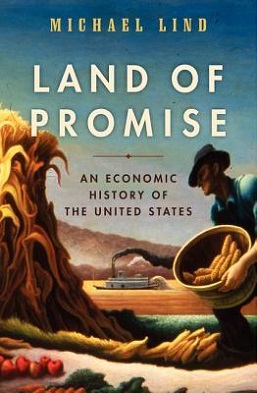Agrarianism is a political and social philosophy that has promoted subsistence agriculture, smallholdings, egalitarianism, with agrarian political parties normally supporting the rights and sustainability of small farmers and poor peasants against the wealthy in society. In highly developed and industrial nations or regions it can denote use of financial and social incentives for self-sustainability, more community involvement in food production and smart growth that avoids urban sprawl and, many of its advocates contend, risks of human overpopulation; when overpopulation occurs the available resources become too limited for the entire population to survive comfortably or at all in the long term.

John Taylor, usually called John Taylor of Caroline, was a politician and writer. He served in the Virginia House of Delegates and in the United States Senate. He wrote several books on politics and agriculture. He was a Jeffersonian Republican and his works provided inspiration to the later states' rights and libertarian movements. Sheldon and Hill (2008) locate Taylor at the intersection of republicanism and classical liberalism. They see his position as a "combination of a concern with Lockean natural rights, freedom, and limited government along with a classical interest in strong citizen participation in rule to prevent concentrated power and wealth, political corruption, and financial manipulation" (p. 224).
Wealth, like suffrage, must be considerably distributed, to sustain a democratic republic; and hence, whatever draws a considerable proportion of either into a few hands, will destroy it. As power follows wealth, the majority must have wealth or lose power.
The American School, also known as the National System, represents three different yet related constructs in politics, policy and philosophy. It was the American policy from the 1790s to the 1970s, waxing and waning in actual degrees and details of implementation. Historian Michael Lind describes it as a coherent applied economic philosophy with logical and conceptual relationships with other economic ideas.
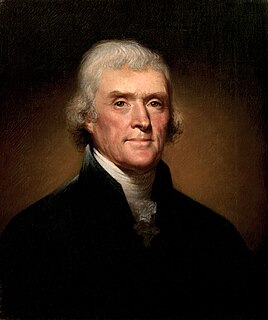
Jeffersonian democracy, named after its advocate Thomas Jefferson, was one of two dominant political outlooks and movements in the United States from the 1790s to the 1820s. The Jeffersonians were deeply committed to American republicanism, which meant opposition to what they considered to be artificial aristocracy, opposition to corruption, and insistence on virtue, with a priority for the "yeoman farmer", "planters", and the "plain folk". They were antagonistic to the aristocratic elitism of merchants, bankers, and manufacturers, distrusted factory workers, and were on the watch for supporters of the Westminster system.
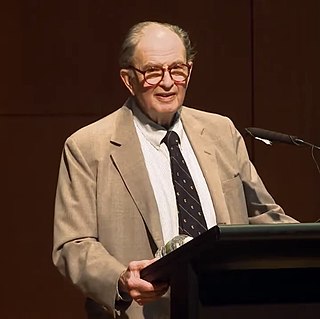
Bernard Bailyn was an American historian, author, and academic specializing in U.S. Colonial and Revolutionary-era History. He was a professor at Harvard University from 1953. Bailyn won the Pulitzer Prize for History twice. In 1998 the National Endowment for the Humanities selected him for the Jefferson Lecture. He was a recipient of the 2010 National Humanities Medal.

The Report on the Subject of Manufactures, generally referred to by its shortened title Report on Manufactures, is the third major report, and magnum opus, of American Founding Father and first United States Treasury Secretary Alexander Hamilton. It was presented to the US Congress on December 5, 1791.
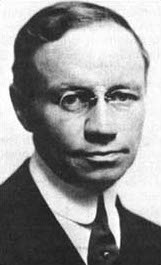
Herbert David Croly was an intellectual leader of the progressive movement as an editor, political philosopher and a co-founder of the magazine The New Republic in early twentieth-century America. His political philosophy influenced many leading progressives including Theodore Roosevelt, Adolph Berle, as well as his close friends Judge Learned Hand and Supreme Court Justice Felix Frankfurter.

Isabel Paterson was a Canadian-American journalist, novelist, political philosopher, and a leading literary and cultural critic of her day. Historian Jim Powell has called Paterson one of the three founding mothers of American libertarianism, along with Rose Wilder Lane and Ayn Rand, who both acknowledged an intellectual debt to Paterson. Paterson's best-known work, The God of the Machine (1943), a treatise on political philosophy, economics, and history, reached conclusions and espoused beliefs that many libertarians credit as a foundation of their philosophy. Her biographer Stephen D. Cox (2004) believes Paterson was the "earliest progenitor of libertarianism as we know it today." In a letter of 1943, Rand wrote that "The God of the Machine is a document that could literally save the world ... The God of the Machine does for capitalism what Das Kapital does for the Reds and what the Bible did for Christianity."
Criticism of libertarianism includes ethical, economic, environmental and pragmatic concerns and is often focused on right-libertarianism. Critics have argued that laissez-faire capitalism does not necessarily produce the best or most efficient outcome, and that libertarianism's philosophy of individualism and policies of deregulation fail to prevent the abuse of natural resources. Criticism of left-libertarianism is instead mainly related to anarchism and includes allegations of utopianism, tacit authoritarianism and vandalism towards feats of civilization. Left and right-libertarians also engage in criticism of each other.
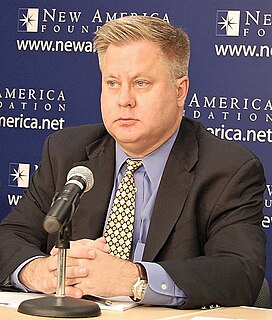
Michael Lind is an American writer and academic. He has explained and defended the tradition of American democratic nationalism in a number of books, beginning with The Next American Nation (1995). He is currently a professor at the Lyndon B. Johnson School of Public Affairs at the University of Texas at Austin.

An Economic Interpretation of the Constitution of the United States is a 1913 book by American historian Charles A. Beard.
Libertarianism is a political philosophy that upholds liberty as a core principle. Libertarians seek to maximize autonomy and political freedom, emphasizing free association, freedom of choice, individualism and voluntary association. Libertarians share a skepticism of authority and state power, but some libertarians diverge on the scope of their opposition to existing economic and political systems. Various schools of libertarian thought offer a range of views regarding the legitimate functions of state and private power, often calling for the restriction or dissolution of coercive social institutions. Different categorizations have been used to distinguish various forms of libertarianism. Scholars distinguish libertarian views on the nature of property and capital, usually along left–right or socialist–capitalist lines.
In the United States, libertarianism is a political philosophy promoting individual liberty. According to common meanings of conservatism and liberalism in the United States, libertarianism has been described as conservative on economic issues and liberal on personal freedom, often associated with a foreign policy of non-interventionism. Broadly, there are four principal traditions within libertarianism, namely the libertarianism that developed in the mid-20th century out of the revival tradition of classical liberalism in the United States after liberalism associated with the New Deal; the libertarianism developed in the 1950s by anarcho-capitalist author Murray Rothbard, who based it on the anti-New Deal Old Right and 19th-century libertarianism and American individualist anarchists such as Benjamin Tucker and Lysander Spooner while rejecting the labor theory of value in favor of Austrian School economics and the subjective theory of value; the libertarianism developed in the 1970s by Robert Nozick and founded in American and European classical liberal traditions; and the libertarianism associated to the Libertarian Party which was founded in 1971, including politicians such as David Nolan and Ron Paul.

The Promise of American Life is a book published by Herbert Croly, founder of The New Republic, in 1909. This book opposed aggressive unionization and supported economic planning to raise general quality of life. By Croly's death in 1930, only 7,500 copies of The Promise of American Life had been sold. Despite this, the book was immensely influential, influencing Theodore Roosevelt to adopt the platform of the New Nationalism after reading it, and being popular with intellectuals and political leaders of the later New Deal.

The First Party System is a model of American politics used in history and political science to periodize the political party system that existed in the United States between roughly 1792 and 1824. It featured two national parties competing for control of the presidency, Congress, and the states: the Federalist Party, created largely by Alexander Hamilton, and the rival Jeffersonian Democratic-Republican Party, formed by Thomas Jefferson and James Madison, usually called at the time the Republican Party. The Federalists were dominant until 1800, while the Republicans were dominant after 1800. Both parties originated in national politics, but soon expanded their efforts to gain supporters and voters in every state. The Federalists appealed to the business community and the Republicans to the planters and farmers. By 1796, politics in every state was nearly monopolized by the two parties, with party newspapers and caucuses becoming effective tools to mobilize voters.
Forrest McDonald was an American historian who wrote extensively on the early national period of the United States, republicanism, and the presidency, but he is possibly best known for his polemic on the American South. He was a professor at the University of Alabama, where, together with Grady McWhiney, he developed the hypothesis that the South had been colonized by "Anglo-Celts," rather than the British Protestant farmers who populated the North.
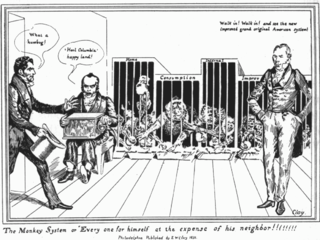
The American System was an economic plan that played an important role in American policy during the first half of the 19th century. Rooted in the "American School" ideas of Alexander Hamilton, the plan "consisted of three mutually reinforcing parts: a tariff to protect and promote American industry; a national bank to foster commerce; and federal subsidies for roads, canals, and other 'internal improvements' to develop profitable markets for agriculture". Congressman Henry Clay was the plan's foremost proponent and the first to refer to it as the "American System".

Radicals for Capitalism: A Freewheeling History of the Modern American Libertarian Movement is a 2007 book about the history of 20th-century American libertarianism by journalist and Reason senior editor Brian Doherty. He traces the evolution of the movement, as well as the life stories of Ayn Rand, Milton Friedman, Ludwig von Mises, F. A. Hayek, and Murray Rothbard, and details how they intertwined.

David Leonhardt is an American journalist and columnist. Beginning April 30, 2020, he writes the daily "The Morning" newsletter for The New York Times. He also contributes to the paper's Sunday Review section. His column previously appeared weekly in The New York Times. He previously wrote the paper's daily e-mail newsletter, which bore his own name. As of October 2018, he also co-hosted a weekly Opinion podcast titled "The Argument", with Ross Douthat and Michelle Goldberg.

Transaction Man: The Rise of the Deal and the Decline of the American Dream is a non-fiction book which chronicles the role of corporations in relation to the American economy and shifts in public policy by Nicholas Lemann, who is a veteran journalist and a The New Yorker staff writer.
